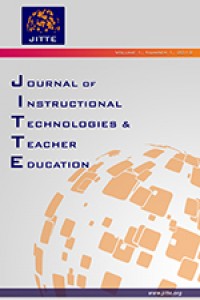The Investigation of Relation Between The Attitude of Students Towards Interactive Board in Education Process and Technological, Pedagogical and Content Knowledge of Teachers
Abstract
The aim of this study is to indicate the relationship between teachers’ technologic pedagogical content knowledge level and students’ attitudes towards the usage of interactive whiteboards. The research was carried out with 45 teachers who were working in a private school attached to National Education Ministry and 632 elementary and secondary school students who were studying in the same school in the education year between 2015-2016 Spring terms. The research is a correlational study. As a correlational tool, “Technologic Pedagogical Content Knowledge Scale” was applied to teachers and “Interactive Board Attitude Scale” was used for students. While analysis of the data obtained from applied scales was being carried out, descriptive statistics, independent groups t-test, single direction variance and correlation analyses were utilized. As a result of the research, it was determined that students’ attitudes towards interactive whiteboards are high; female students’ attitudes are meaningfully higher than male ones’ statistically; students’ attitudes towards interactive white boards do not alter in accordance with class grades and also teachers’ technologic pedagogical content knowledge level is high. It is also indicated that there is not any encountered meaningful relationship statistically between points of students’ attitudes towards interactive white board and teachers’ technologic pedagogical content knowledge.
References
- Adıgüzel, T., Gürbulak, N. ve Sarıçayır, H. (2011). Akıllı tahtalar ve öğretim uygulamaları. Mustafa Kemal Üniversitesi Sosyal Bilimler Enstitüsü Dergisi. 2,8, 457-471.
- Akdemir, E. (2009). Akıllı tahta uygulamalarının öğrencilerin coğrafya ders başarıları üzerine etkisinin incelenmesi. Yüksek Lisans Tezi, Zonguldak Karaelmas Üniversitesi, Sosyal Bilimler Enstitüsü, Zonguldak.
- Akgün, M. ve Koru, G. (2015). Akıllı tahta kullanımına yönelik öğrenci tutumu ve öğretmen görüşlerinin incelenmesi (Ankara ili örneği). Qualitative Studies, (1), 1-12.
- Akpınar, Y. (2004). Eğitim teknolojisiyle ilgili öğrenmeyi etkileyebilecek bazı etmenlere karşı öğretmen yaklaşımları. The Turkish Online Journal of Educational Technology- TOJET. 3(3), 124-134.
- Altınçelik, B. (2009). İlköğretim düzeyinde öğrenmede kalıcılığı ve motivasyonu sağlaması yönünden akıllı tahtaya ilişkin öğretmen görüşleri. Yayınlanmamış yüksek lisans tezi, Sakarya Üniversitesi Sosyal Bilimleri Enstitüsü, Sakarya.
- Armstrong, V., Barnes, S., Sutherland, R., Curran, S., Mills, S., & Thompson, I. (2005). Collaborativeresearchmethodologyforinvestigatingteachingandlearning: The use of interactive white board technology. Educational Review, 57(4), 457-469.
- Aşkar, P. ve Işıksal, M. (2003). İlköğretim öğrencileri için matematik ve bilgisayar öz-yeterlik algısı ölçekleri. Hacettepe Üniversitesi Eğitim Fakültesi Dergisi, 25, 109-118.
- Bağcı, H. (2013).Fatih projesi çerçevesinde ortaöğretim öğrencilerinin etkileşimli tahtaya yönelik görüşlerinin incelenmesi. Yayınlanmamış Doktora Tezi, Okan Üniversitesi, İstanbul.
Abstract
References
- Adıgüzel, T., Gürbulak, N. ve Sarıçayır, H. (2011). Akıllı tahtalar ve öğretim uygulamaları. Mustafa Kemal Üniversitesi Sosyal Bilimler Enstitüsü Dergisi. 2,8, 457-471.
- Akdemir, E. (2009). Akıllı tahta uygulamalarının öğrencilerin coğrafya ders başarıları üzerine etkisinin incelenmesi. Yüksek Lisans Tezi, Zonguldak Karaelmas Üniversitesi, Sosyal Bilimler Enstitüsü, Zonguldak.
- Akgün, M. ve Koru, G. (2015). Akıllı tahta kullanımına yönelik öğrenci tutumu ve öğretmen görüşlerinin incelenmesi (Ankara ili örneği). Qualitative Studies, (1), 1-12.
- Akpınar, Y. (2004). Eğitim teknolojisiyle ilgili öğrenmeyi etkileyebilecek bazı etmenlere karşı öğretmen yaklaşımları. The Turkish Online Journal of Educational Technology- TOJET. 3(3), 124-134.
- Altınçelik, B. (2009). İlköğretim düzeyinde öğrenmede kalıcılığı ve motivasyonu sağlaması yönünden akıllı tahtaya ilişkin öğretmen görüşleri. Yayınlanmamış yüksek lisans tezi, Sakarya Üniversitesi Sosyal Bilimleri Enstitüsü, Sakarya.
- Armstrong, V., Barnes, S., Sutherland, R., Curran, S., Mills, S., & Thompson, I. (2005). Collaborativeresearchmethodologyforinvestigatingteachingandlearning: The use of interactive white board technology. Educational Review, 57(4), 457-469.
- Aşkar, P. ve Işıksal, M. (2003). İlköğretim öğrencileri için matematik ve bilgisayar öz-yeterlik algısı ölçekleri. Hacettepe Üniversitesi Eğitim Fakültesi Dergisi, 25, 109-118.
- Bağcı, H. (2013).Fatih projesi çerçevesinde ortaöğretim öğrencilerinin etkileşimli tahtaya yönelik görüşlerinin incelenmesi. Yayınlanmamış Doktora Tezi, Okan Üniversitesi, İstanbul.
Details
| Journal Section | Research Article |
|---|---|
| Authors | |
| Publication Date | October 30, 2016 |
| Published in Issue | Year 2016 Volume: 5 Issue: 3 |

